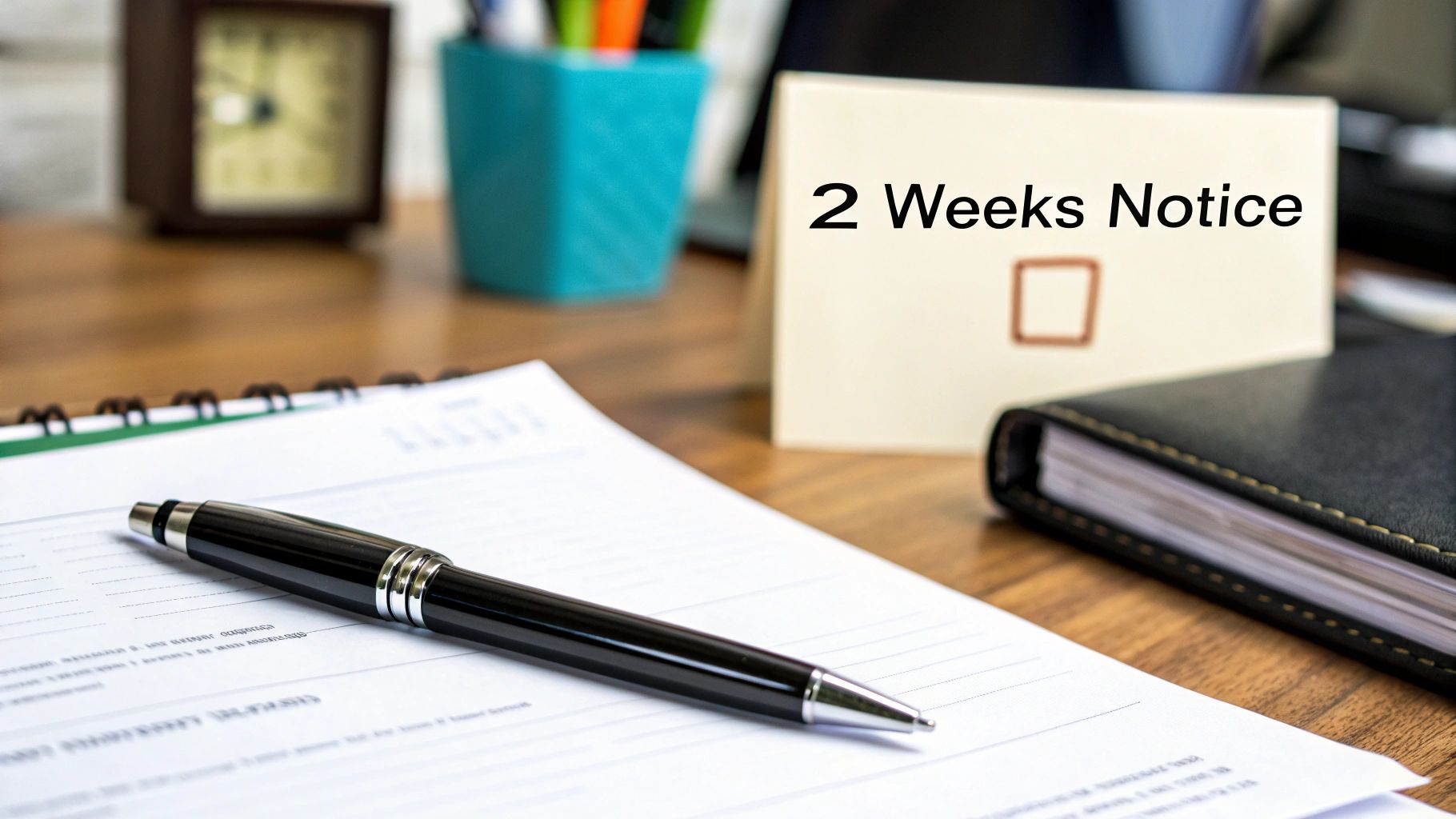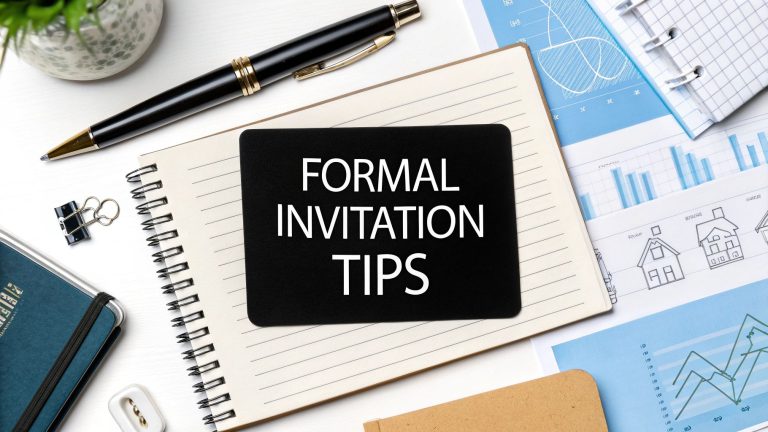Thinking about quitting your job? Your 2 weeks notice letter isn't just a formality—it's one of the most important documents you'll write in your career. It officially tells your boss you're leaving, locks in your last day, and sets the stage for a smooth exit.
Getting this right protects your reputation and keeps doors open you might need later.
Why A Professional Resignation Letter Still Matters
How you leave a job says a lot about you. It might be tempting to just have a quick chat and call it a day, but a formal resignation letter has a lasting impact on your career. Think of it as your final professional handshake with the company.
A good letter does more than just announce your departure. It's a strategic move that can shape your professional future.
- It keeps your network strong. You'd be surprised how small your industry can feel. A respectful resignation means former bosses and colleagues will remember you well, turning them into allies for years to come. You never want to burn a bridge.
- It helps secure a great reference. When your next potential employer checks references, who do you think they'll call first? Your last manager. A professional notice makes it easy for them to give you a glowing recommendation.
- It makes the transition easier for everyone. Offering to help train your replacement or tie up loose ends shows you're a team player, right to the very end. It's a small gesture that leaves a huge positive impression.
Take a look at how a professional exit can directly impact your career down the road.
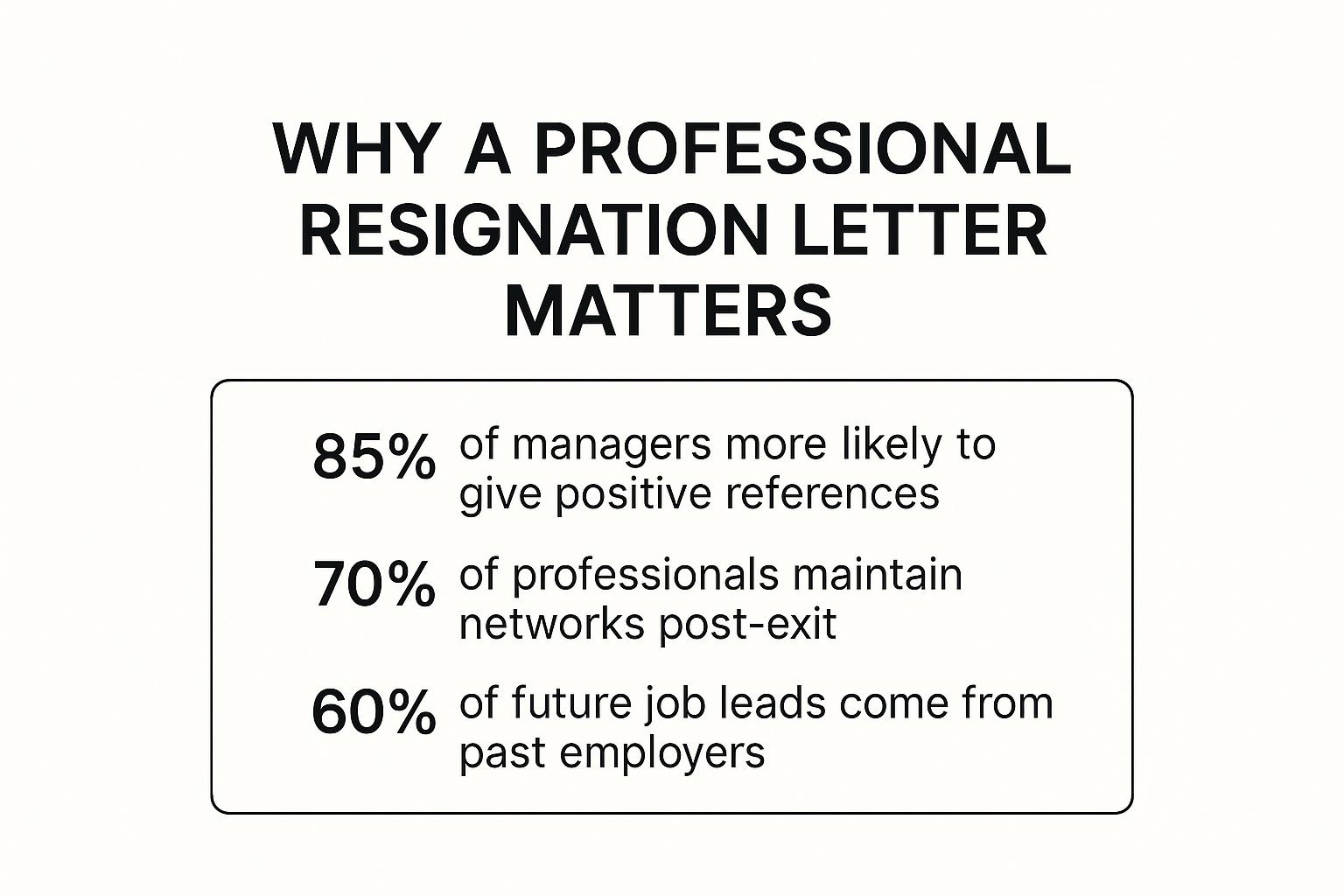
As you can see, leaving on good terms is directly linked to keeping your network healthy and creating future opportunities. There's a reason giving proper notice is such a standard professional practice.
Failing to do it can cause real headaches for the team you're leaving behind. As experts at Boutique Recruiting point out, clear communication is key to a smooth transition. This simple document is your best tool for protecting your career for years to come.
What Makes a Great Resignation Letter?
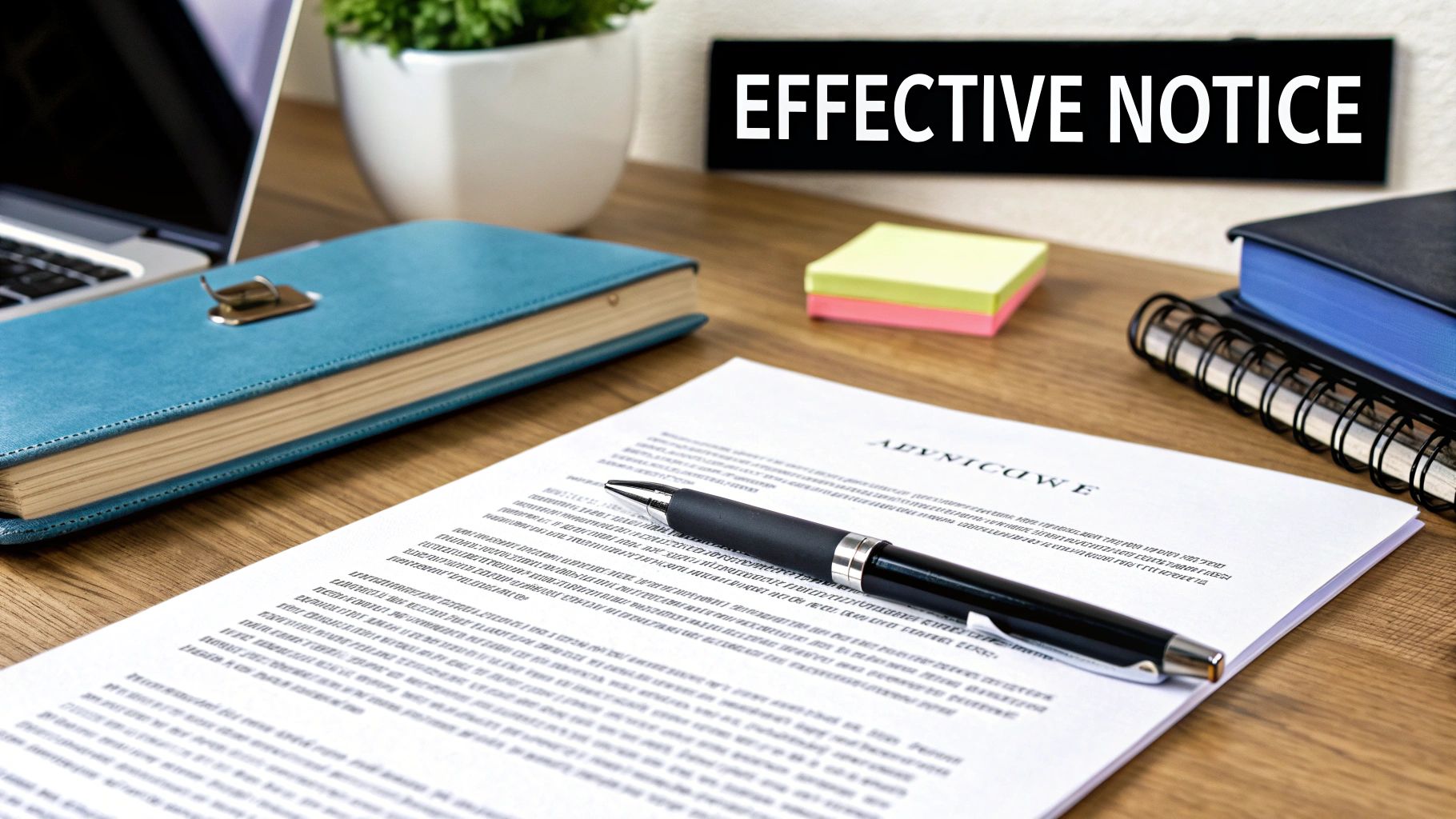
Think of your resignation letter as more than just a formality. It’s your final professional statement, a document that needs to be clear, direct, and respectful all at once. Every part of it, from the date at the top to your signature at the bottom, plays a role in leaving a positive, lasting impression.
Getting the structure right is key. It eliminates any potential for confusion and shows you’re handling your departure with maturity.
Before you even write the body of the letter, you need to get the basic formatting down. This means including your contact information, the date, and your manager’s details right at the top. It’s a small detail, but it sets a professional tone from the get-go. If you're unsure, brushing up on how to format a letter is a smart move.
The Opening: Be Clear and Direct
Your first sentence is the most critical. This is not the time for ambiguity. You need to state your intention to resign and clearly specify your final day of employment.
- What to avoid: "After some thought, I've decided it might be time for me to explore new opportunities." This sounds hesitant and might even be mistaken for an attempt to negotiate.
- What to write: "Please accept this letter as formal notification of my resignation from the position of Marketing Coordinator. My last day with the company will be Friday, October 25th."
This is direct, professional, and leaves no room for misinterpretation. Naming your exact last day helps HR and payroll and establishes a firm, professional timeline for your exit.
The Middle: Express Thanks and Offer Help
Once you've stated the facts, shift your tone to one of gratitude. This is your chance to thank your employer for the opportunity they gave you. You can make it more personal and sincere by mentioning a specific project you enjoyed or a skill you developed during your time there.
The goal here is to be remembered as a grateful and mature professional, not someone running for the exit. This is where you solidify that positive final impression.
Finally, wrap up by offering to help make the transition as smooth as possible. You don't need to write a paragraph on this; a simple, sincere sentence will do. Something like, "I am happy to help train my replacement and ensure a smooth handover of my duties over the next two weeks."
This offer shows you’re a team player right up until the very end.
To help you put it all together, here’s a quick breakdown of the essential components your letter should include.
Key Elements of Your Resignation Letter
| Component | Purpose | Example Snippet |
|---|---|---|
| Professional Heading | Provides essential contact info and date for official records. | Your Name, Your Address, Date, Manager's Name & Title |
| Clear Statement of Resignation | Directly and formally states your intent to leave and your title. | "Please accept this letter as my formal resignation from my role as [Your Job Title]…" |
| Specific Last Day | Sets a clear timeline and avoids any confusion for payroll/HR. | "…effective two weeks from today. My final day will be [Your Last Day]." |
| Expression of Gratitude | Maintains a positive relationship by acknowledging the opportunity. | "I am grateful for the opportunity to have worked on the [Project Name] project." |
| Offer of Transition Support | Shows professionalism and commitment to a smooth handover. | "I am committed to ensuring a seamless transition and will support the team in any way I can." |
| Professional Closing | Ends the letter on a polite and respectful note. | "Sincerely," or "Best regards," followed by your signature and typed name. |
Following this structure—clear intent, genuine gratitude, and a helpful closing—is the foundation of any effective 2 weeks notice letter. It’s the best way to protect your professional reputation and maintain the relationships you've built.
A Simple And Professional 2 Weeks Notice Letter Template
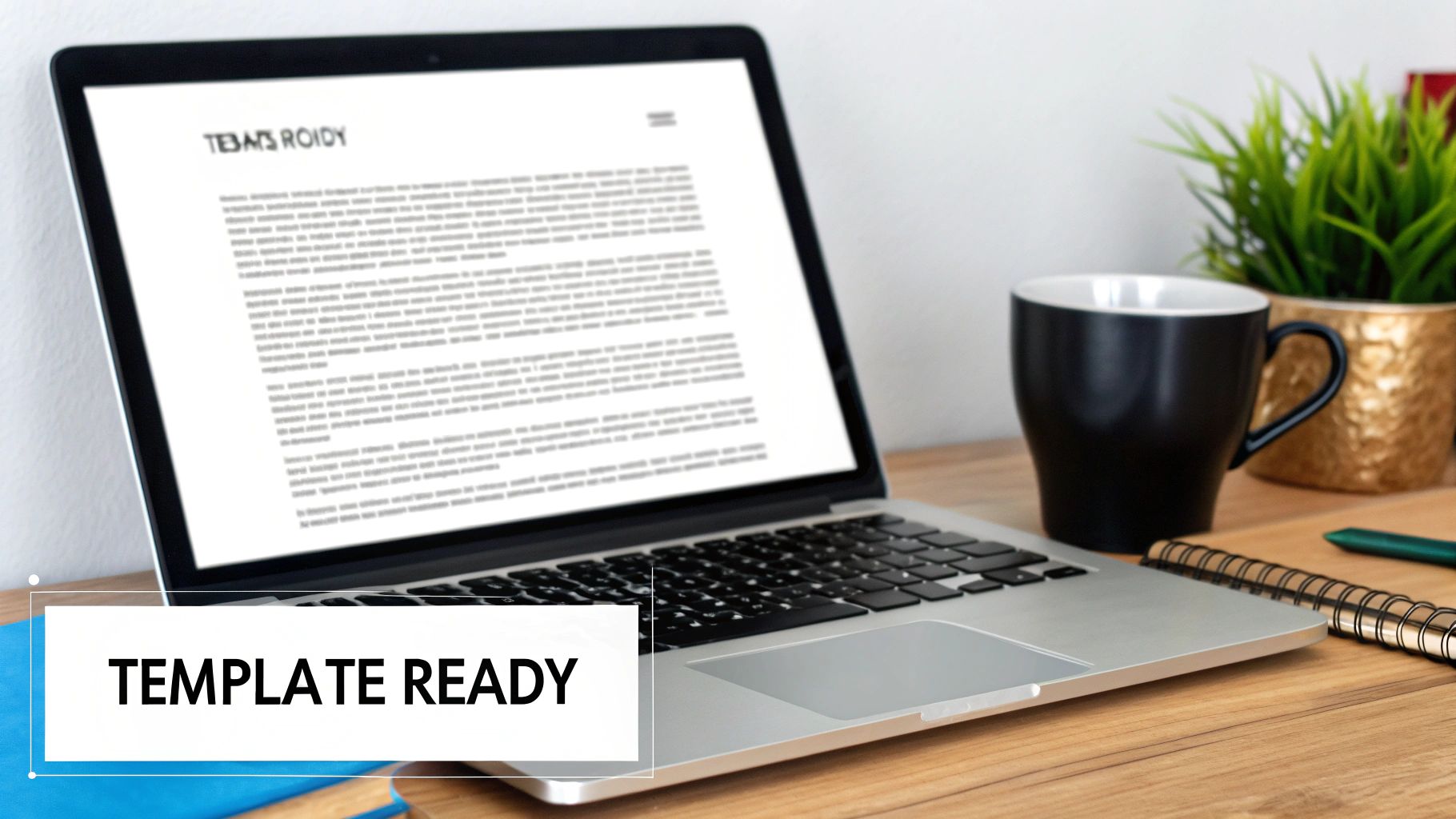
When it's time to write your resignation, you don't need to reinvent the wheel. Here’s a straightforward and professional 2 weeks notice letter template that I've seen work perfectly in countless situations. It’s designed to be clear and concise, hitting that sweet spot between being formal and genuinely warm.
I’m not just going to give you a template to copy and paste. Below, I’ll break down why each part is there and what it accomplishes. Once you understand the thinking behind each sentence, you'll feel much more confident tailoring it to your own situation.
The Go-To Resignation Letter Template
[Your Name]
[Your Address]
[Your Phone Number]
[Your Email Address]
[Date]
[Manager’s Name]
[Manager’s Title]
[Company Name]
[Company Address]
Dear [Manager’s Name],
Please accept this letter as formal notification of my resignation from my position as [Your Job Title] at [Company Name]. My last day of employment will be [Your Last Day], which is two weeks from today.
I am very grateful for the opportunities I have been given here. I’ve genuinely enjoyed my time at [Company Name] and particularly valued [mention one specific positive, e.g., the chance to work on the X project or the support from the team].
I am committed to ensuring a smooth transition during my final two weeks. Please let me know how I can best assist in handing over my duties and training my replacement.
Thank you again for everything. I wish you and the company all the best for the future.
Sincerely,
[Your Signature (for a printed letter)]
[Your Typed Name]
Key Takeaway: Notice how this template is direct but not cold. It gets right to the point with the essential facts, adds a touch of genuine gratitude for a specific experience, and offers help without promising the world.
This structure gives you a solid, reliable foundation. If you want to explore more personalized versions, a tool like this free resignation letter generator can help you quickly draft something that feels right for you.
As you’re wrapping things up at your current job, it’s also the perfect time to get ready for what’s next. Polished documents are key to landing that new role, and using effective resume templates can make all the difference. Think of it this way: your resignation letter is about leaving well, and a great resume is about starting well.
How To Adapt Your Letter For Different Scenarios
Your specific situation really matters, and a generic 2 weeks notice letter template isn't always the right tool for the job. The real secret is to match the tone of your letter to the culture of your workplace.
Think about it: if you're leaving a buttoned-up corporate law firm, you'll want to stick to traditional phrasing and a very professional tone. But if you're leaving a small startup where you have lunch with the CEO every week, a warmer, more personal message will feel much more natural and genuine.
Key Takeaway: The goal isn't just to inform, but to communicate in a way that honors the relationships you've built. A one-size-fits-all approach can easily come off as cold or out of touch.
Tailoring Your Tone And Content
Adjusting your letter for your unique circumstances shows that you're thoughtful and self-aware. It’s a small detail, but it can make a huge difference in the final impression you leave behind.
Here are a few common situations I've seen and how to navigate them:
- Leaving on Less-Than-Perfect Terms: If things are tense, keep it short, sweet, and strictly professional. State your resignation, provide your last day, and offer to help with the transition. This is not the time or place to air grievances or get emotional.
- Moving to a Direct Competitor: Be discreet. There's no need to mention your new employer by name in the letter. Your only focus should be on wrapping up your duties and ensuring a clean, professional exit.
- Resigning for Personal Reasons: You are not obligated to share the details of your life. A simple, vague phrase like "for personal reasons" or "to attend to a family matter" is perfectly acceptable and professional.
The way people leave jobs has definitely changed, especially in smaller companies. Businesses with fewer than 1,000 employees have actually seen higher quit rates recently, which makes clear, respectful communication during a departure more critical than ever. You can dig into more data on these workforce shifts over on the BLS website.
At the end of the day, every resignation is a little different. For a more detailed walkthrough of getting the wording just right, take a look at our complete guide on how to write a resignation letter.
Common Resignation Mistakes You Need To Avoid
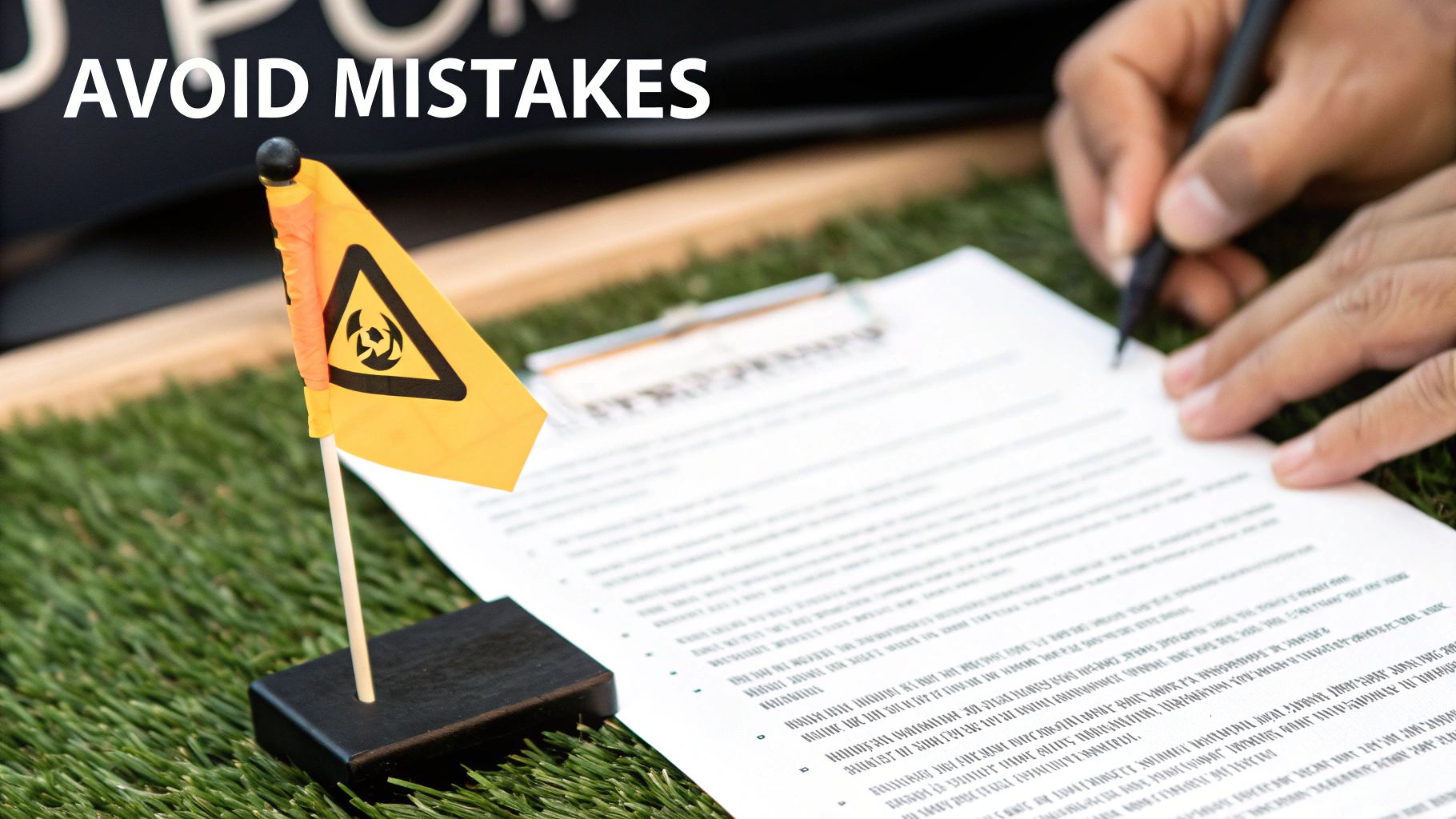
The final impression you leave is often the one that sticks. Navigating your exit requires a bit of finesse, because a few common slip-ups can easily tarnish years of hard work and sour good professional relationships. Your resignation letter is a formal document, not a diary entry.
One of the most damaging mistakes I’ve seen people make is using their letter to vent frustrations. Complaining about your manager, salary, or the company culture in your official notice is a move that never pays off. It just burns bridges and makes you look unprofessional, a reputation that can follow you for years.
Vague Dates And Overpromising
Clarity is everything when you resign. A major pitfall is being fuzzy about your last day. Using phrases like "I'll be leaving in a couple of weeks" just creates confusion for HR and your team. You have to state a specific date.
Another common error is overcommitting to what you can realistically get done before you leave. While it's great to offer help with the transition, promising to complete massive projects or train multiple replacements sets you up for failure. This only creates more stress for you and can leave your team feeling let down when you can't deliver.
A professional exit is all about maintaining respect and clarity. Avoid emotional language, ambiguous timelines, and informal communication channels to ensure your departure is smooth and protects your reputation.
The "Great Resignation" really highlighted how much these protocols matter. For instance, in September 2021 alone, a staggering 4.4 million people in the U.S. quit their jobs. This massive shift underscored just how critical professional resignation etiquette has become.
Understanding proper letter writing etiquette and its dos and don'ts can help you sidestep these common errors. For even more insights on navigating career transitions, the articles on JobCopilot's blog offer some excellent guidance.
Answering Your Lingering Questions About Giving Notice
So, you’ve got your 2 weeks notice letter template ready to go, but you might still have a few nagging questions. It's completely normal. Resigning feels like a big step, and it’s natural to wonder about the "unwritten rules" of the process.
Let's tackle some of the most common questions I hear from people navigating this transition.
Probably the biggest one is: Do I have to explain why I'm leaving? The short answer is no. You have zero obligation to get into the details of your next move or your reasons for resigning. A simple, polite statement that you're leaving is all you need.
Is It Okay to Email My Resignation Letter?
Absolutely. Emailing your notice is standard practice these days, particularly if you work remotely or for a large company.
The best way to handle it is to tell your manager directly first—ideally face-to-face or on a video call. Then, send your formal letter via email right after that conversation. This approach is the perfect blend of personal respect and official documentation.
Of course, if you work in a more traditional office, handing your manager a printed letter is a classic, formal touch that’s always appreciated.
My Two Cents: Whatever you do, don't resign over text or a quick Slack message. It comes across as unprofessional and can burn bridges. Stick to a formal letter, whether it's an email or a physical copy, to keep everything official and create a clear record for HR.
What if They Ask Me to Leave Right Away?
This can be jarring, but it happens. Some companies have a policy where they escort you out the door the moment you resign, usually for security reasons or if you’re heading to a competitor.
If this happens to you, the key is to stay cool and professional. Don't take it personally. Politely ask for clarification from HR on how they’ll handle your final paycheck and any unused vacation time you’re owed.
Remember, this is almost always just standard company procedure and not a reflection on you or your work. Handling it with grace ensures you leave on the best possible terms.
Ready to get your letter written in just a few clicks? The AI Letter Generator can craft a polished, professional draft for you in seconds. Give our free resignation letter tool a try and make your career move a little less stressful.
